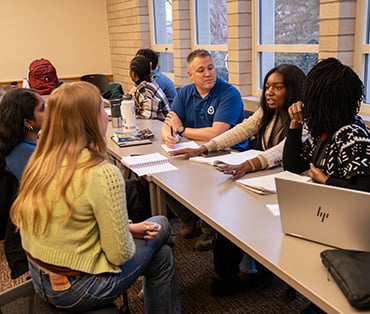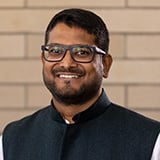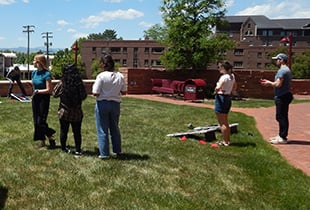How Top Schools Invest In Student Success
THIS GUIDE IS NO LONGER ACTIVE. For the current FP Guide, click here.
University of Denver, Josef Korbel School of International Studies
Understanding Global Challenges: From War Simulations to Immigration Court

The University of Denver’s Josef Korbel School of International Studies engages its graduate students in today’s global issues using experiences that range from simulating diplomatic war negotiations to attending court hearings for undocumented workers.
Korbel School prepares students to work in a multidisciplinary, international field by having professors from academic, professional, and industry backgrounds in the classroom.
“Sitting in a classroom and absorbing a lecture is not the only form of learning, and for some people, not the optimal form of learning,” Assistant Professor Debak Das says.
For the last two years, the Josef Korbel School has offered a simulation exercise of diplomatic negotiations over past and present conflicts, including Russia’s war on Ukraine and nuclear escalation in the Indo-Pacific. The Russia/Ukraine exercises are led by Dr. Das, a political scientist who focuses on international security and completed his PhD on nuclear weapons proliferation.

“Sitting in a classroom and absorbing a lecture is not the only form of learning, and for some people, not the optimal form of learning.” –Debak Das, Assistant Professor, Josef Korbel School of International Studies, University of Denver
During the simulation, Das starts by explaining to students the history that led up to the conflict. Students are divided into five-person groups by country, in which they assume key national security roles, such as president and secretary of defense. Students have three rounds of negotiations with other groups to try to resolve conflicting interests.
“It’s like using war-gaming as a pedagogical tool,” Das says. “Students have learned compromise, decision-making, collaboration.”
Another experiential approach at the Josef Korbel School involves in-the-field experiences with international issues. As part of a class about migration taught by an anthropologist, students attend Denver County court hearings for undocumented workers and intake sessions for immigrants who recently arrived in the city. This level of exposure to real-time global issues is unmatched by other graduate programs in the West.
Students at the Josef Korbel School arrange and complete an internship, choosing the location and organization based on their interests. Students benefit from the school’s interdisciplinary approach to teaching, which reflects the reality of international work. For example, one of the three required courses for all master’s degree candidates, “Great Issues,” is co-taught by a half-dozen professors with different academic backgrounds, bringing a unique and innovative perspective to the classroom.
“It’s important to introduce them to different ways of thinking that come from these different disciplines,” Das says.
Unlock Opportunities: Student Involvement Beyond the Classroom
The Rocky Mountains are within driving distance of the Josef Korbel School, and downtown Denver, Colorado, is a light rail ride away. Here is a sample of activities that graduate students can participate in outside of the classroom:
• Eight student-led organizations, with activities ranging from activism to entertainment
• Internships with companies and organizations, including the FBI, Defense Intelligence Agency, Amnesty International, and The Aspen Institute
• Guest lectures from working diplomats, policymakers, thought leaders, founders, and community leaders
• Study for a quarter in Rio de Janeiro, Brazil; Geneva, Switzerland; Vienna, Austria; or Washington, DC
University of Denver, Josef Korbel School of International Studies
https://korbel.du.edu
[email protected]
303-871-2544![]()
Contents
- How Top Schools Invest In Student Success
- George Washington University, Elliott School of International Affairs
- Rice University, School of Social Sciences
- Princeton University, Princeton School of Public and International Affairs
- Augusta University, Pamplin College of Arts, Humanities, and Social Sciences
- The Fletcher School at Tufts University
- Indiana University, Hamilton Lugar School of Global and International Studies
- Columbia University, School of International and Public Affairs
- Penn State University, School of International Affairs
- Texas A&M University, Bush School of Government & Public Service
- Georgetown University, School of Foreign Service
- University of Denver, Josef Korbel School of International Studies
- Yale University, Jackson School of Global Affairs
- George Mason University, Schar School of Policy and Government
- American University, School of International Service
- Seton Hall University, School of Diplomacy and International Relations
- Johns Hopkins University School of Advanced International Studies
